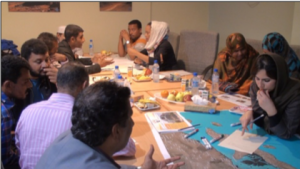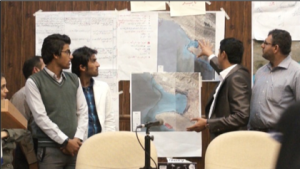First published on 10/19/2014, and last updated on 02/19/2018
By: Centre for Sustainable Management and Environment (CENESTA), Member of the ICCA Consortium
A multi-stakeholder workshop was organised by Cenesta on the role of ICCAs in conservation of marine and coastal biodiversity in Qeshm, with representatives from local communities, NGOs, university, and government. Among the participants were several officials from the Department of Environment (DoE), the Board of Qeshm Island Geo-Park, and the Board of Qeshm Free Zone.
The workshop covered a range of issues and mainstreams including: Iran’s national and international obligations on protected areas (including Aichi targets, IUCN Matrix on governance and protected areas types, NBSAP, PoWPA); the appropriate recognition and registration of coastal and marine ICCAs; Participatory models of bio-cultural diversity documentation; development of conservation-based sustainable livelihoods; Re-empowerment of IPs and LCs community-based Organisations (CBOs).
In the second part of this workshop, participants were separated into three working groups, namely: government, local communities and NGOs, in order to discuss each group’s role in nature conservation and sustainable development, recognition and support of ICCAs and the existing threats and challenges towards this target. At the end, each group presented the achieved results to the other groups.
Local community working group: They illustrated the locations of their ICCAs and its threats on maps as well as on Google Earth. They also marked the borders of Nayband National Park, and two cities of Assalouyeh and Nakhle Taghi. Then they described the timeline transformation for these areas on a diagram. They described the Pars Special Economic Energy Zone (PSEEZ) as their former pastures and farm lands.
NGO Group: Following the workshop objective of restoration the ICCAs’ role in conservation of bio-cultural diversity in marine and coastal areas, the working group of NGOs discussed about the role of NGOs in supporting ICCAs; and the challenges and threats for NGOs in making awareness about ICCAs.
Government working group: They discussed about the transformation of governance to ICCAs, and its potential to be implemented. Considering the success models of customary management systems existing in Qeshm Island and Cenesta’s experience in the country, they accepted that local communities are the best managers of their own ICCAs and that a part of the power should be shared with them.
The next steps to strengthen the community performance in executive affairs are to establishing the CBOs and funds. The workshop also facilitated the discussion between IPs and LCs with the government and PSEEZ on the participatory management systems.
Cenesta continued this multi-stakeholder session with some small workshops and meetings in the area, to achieve the expected results.
The outcomes of this workshop:
- PMapping and PGIS of ICCAs, wildlife habitats, and livelihoods plans;
- Assessment of the previous and on-going community livelihood activities for future plans;
- CBO establishment;
- Participatory definition of some sustainable livelihood models;
- Sharing and documenting of the indigenous knowledge, customary management and governance systems and bio-cultural diversity;
- Setting up a multi-stakeholder Advisory and Support Council on Sustainable Livelihood;
- Supporting wealth generation activities, co-financing and transferring Seed Grant Funds to selected ICCA pilots;
- Carrying out the feasibility study and marketing;
- Participatory compiling of legal issues and the reforming recommendations from community.


